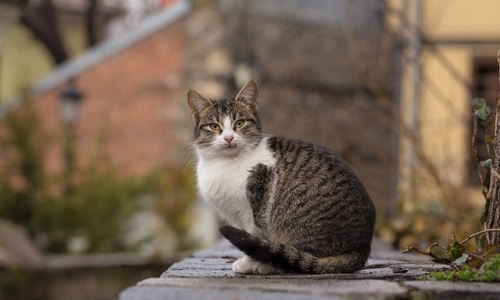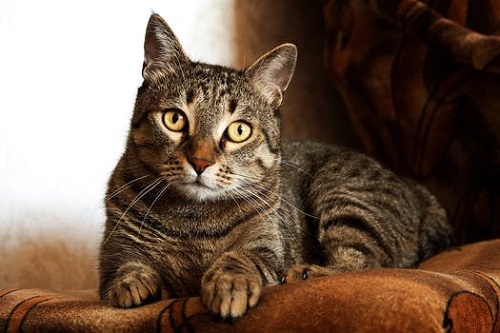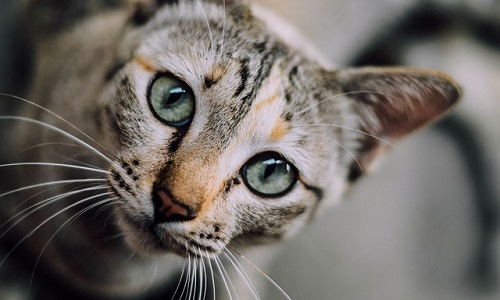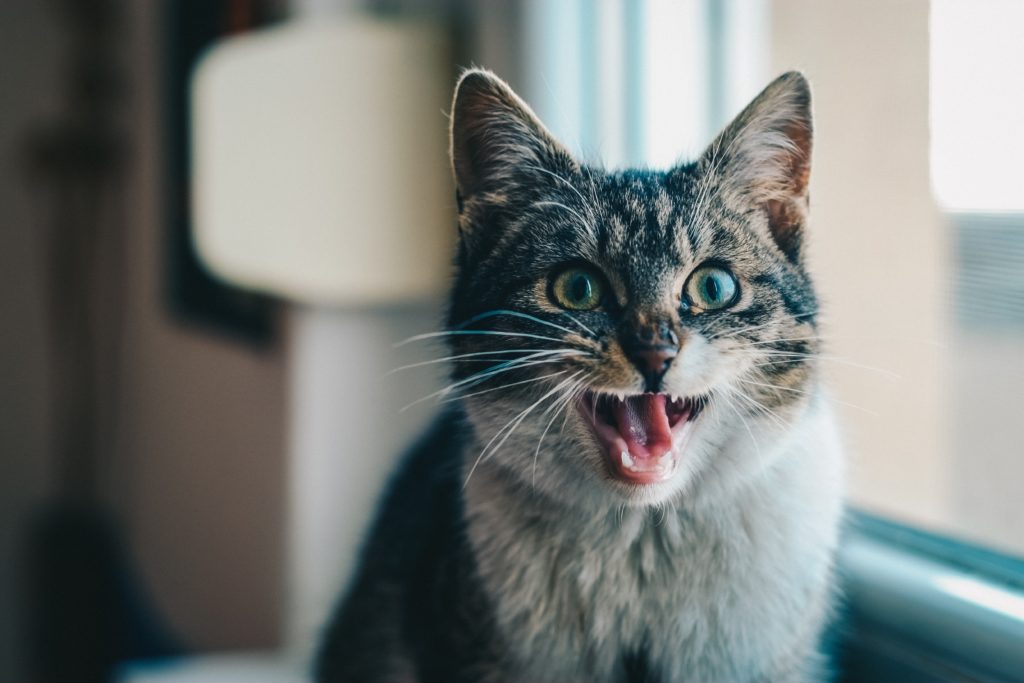Ever heard your cat make a funny noise and wondered what it could be? Are cat hiccups actually a thing? Of course they are! It’s actually a little comical too. However, it’s not exactly common, so that makes this a good question. Some pet owners may never have seen such a phenomenon before. If you haven’t, relax! Your cat probably isn’t trying to throw up or anything, they are merely hiccuping. Hiccups sort of mimic the motion a cat makes when trying to retch or vomit something up, so sometimes a pet owner can become confused when their cat has hiccups.
Cats can experience similar physical ailments to humans. They can get sick, cats can suffer from allergies, they can suffer from feline vomiting or diarrhea, they can have diseases like feline cancer and yes, cats can even have hiccups.
What to Do if Your Cat Has Hiccups
First of all, don’t freak out and get your cat all worked up. Give your cat some space and let him do his thing because there’s really not much you can do to help. In most cases, when a cat develops a case of the hiccups, they will go away on their own with no intervention from you necessary. You also shouldn’t attempt any old-wives tales that are purported to work on humans for hiccups. These include trying to force your cat to hold his breath, hanging your cat upside down, or scaring your cat to death. Really, don’t do any of these! They “might” work on humans, but we guarantee they will not work for your cat.
However, if you notice your cat’s hiccups seem to be intensifying, if you notice that other symptoms seem to be appearing, or if your cat seems unable to stop hiccuping after a reasonable amount of time, you should take them to see your vet right away. There could be something more serious going on that you definitely will not be able to correct on your own. Your vet can help you get to the bottom of it.

How Common Are Hiccups in Cats?
Though it isn’t a common occurrence, it is completely normal and not typically a cause for concern. Just like with hiccups in dogs, kittens are more prone to getting hiccups that older cats, however, any cat can have hiccups under the right circumstances and conditions. Though the phenomenon can seem a little cute, especially when it happens in kittens, hiccups for your cat aren’t any more fun than hiccups for you. If you notice that your cat seems to be hiccuping a lot in a short time period, or they are having episodes several times a day, you should probably see your vet just to make sure there’s nothing more serious going on.
Symptoms of Hiccups in Cats
A hiccup is a strange thing. It can cause your cat to make bizarre noises, such as squeaking or chirping when he breathes. He may make a sound like something is stuck in his throat when he tries to meow. Sometimes it can even sound as though your cat is retching or coughing, even if they’re not. In fact, there are some vets who call a hiccup a hiccough… but they both mean the same thing. Hiccups are not a cat cough, and coughing is a much more serious problem than a hiccup.
Your cat may also show signs of having trouble breathing, such as wheezing, and in many cases, you’ll notice the spasm that occurs when his diaphragm contracts with a hiccup. It may be visible or you may have to touch your cat to feel it, but the signature spasms and contractions will definitely be present when a cat has hiccups.
Remember that the sound and motion of hiccups is pretty unique. Cats can also do weird things like burp, gurgle, grind their teeth, and reverse sneeze. If you can, try to get a short video of what your cat is doing to show your vet if necessary, or at the very least, be sure to pay careful attention to the type of movement and sounds he is making so you can describe them effectively.
What Causes Hiccups in Cats?
Hiccups are what happens when your cat’s muscles that span the rib cage (known as the diaphragm) and your cat’s glottis (a part of your cat’s vocal cords) contracts. This action is an involuntary spasm that triggers odd sounds and abrupt changes to their breathing, otherwise known as a hiccup. There are several reasons cats can experience hiccups.
Note first that sometimes cats may cough, which can make pet owners think they have hiccups. But coughing and hiccups aren’t the same, though they can sometimes sound similar. However, coughing is definitely a more serious ailment and can be a sign of deeper issues, like choking on an object stuck in the throat or even serious health problems like tumors and heartworms. Cats can also cough due to feline asthma or because of cat allergies related to something in their environment. So, coughing and hiccuping are definitely not the same thing.
So why do cats hiccup? One of the most common reasons cats may develop hiccups is because they can be little piggies and eat way too fast, or they eat way too much. Sometimes both! This might be because they are greedy or they could be competing for food with other cats in the household, which is why it’s sometimes better to feed cats in separate locations if you have more than one.
Whatever the reason, when a cat eats too fast, they fail to chew their food completely and end up swallowing air. When they swallow air, especially if they swallow too much of it, they can get hiccups and even get sick to their stomach and throw up. Sounds familiar, right?
Cats may be different from us, but some things really aren’t that different! The same way eating too quickly can cause hiccups, so can overeating. It’s even worse if they overeat and do it quickly. If you have ever scarfed down a plate of food yourself and regretted it later, you should be able to understand what happens when your cat does the same. Talk about hiccups, bloat, and misery!
Sometimes, cats may get hiccups because of irritation in their throat, usually caused by those dreaded hairballs. When a cat tries to cough up a hairball, they use their throat muscles to cough and contract, trying to loosen and expel the fur trapped there. This can cause them to swallow air and can trigger hiccups. Thankfully, that’s one similarity we humans do not share with our feline friends.
There are several other reasons a cat may develop hiccups, especially if your cat’s hiccups appear to be ongoing or are happening frequently. One underlying problem could be emotional issues. Cats can experience issues like feline separation anxiety, which can trigger subsequent physical phenomena like hiccups (among other things). Any negative emotion like fear, stress, anxiety, and panic can all be an originating source of feline hiccups.
Cats can also be ill with something more serious, such as various disease, tumors, or nerve issues. You just never know, so if your cat is hiccuping a lot and the problem seems to be persistent, you should see your vet and let them rule out anything more serious. It’s always better to play it safe than to be sorry later. Ultimately, hiccups still remain a bit of a mystery to the experts, whether it’s a cat hiccuping or a human. We may know how they work, but we can’t always know what’s causing them.
Treating Cat Hiccups
Treatment for hiccups in cats isn’t so much treatment as preventatives. Hiccups are a natural problem and they tend to resolve on their own without any human interventions necessary. If you think your cat could have something more serious going on, you should always default to seeing your vet for reassurance and to make sure all is well.
If you suspect your cat has hiccups from eating too much or eating too quickly, then you should take steps to mitigate this behavior. Try feeding your cat smaller meals throughout the day rather than one or two larger meals. If you suspect there is a little healthy feline competition going on, create feeding stations in your home for each cat so that they are separated from each other and can eat in peace.
You might even try feeding each cat at different times if necessary, although separating them should do the trick. You could also try feeding your cat from a bowl that is placed on a riser. The height of the food bowl will force your cat to slow down as they eat and reduce the chances of developing hiccups.
You should also monitor your cat and make sure he is drinking plenty of water. Cats can be finicky creatures and sometimes prefer cascading water over standing water in a bowl. If you notice your cat doesn’t seem to be drinking much, this could be why. Water is necessary for their digestive system to work efficiently. Try giving him his water from an inexpensive water fountain and see if he naturally increases his water intake on his own.
Since one of the other big reasons cats get hiccups is related to hairballs, it’s also important for you to manage that problem as well. You can try different foods that are designed to reduce hairballs in cats or try one of the gel supplements that help provide lubrication and promote normal shedding for your cat.
You should also make sure you brush and groom your cat on a regular basis to help remove loose fur and discourage them from over-grooming themselves. Cats can sometimes get too enthusiastic with self-grooming and become the cause of all their hairball and hiccup woes.
If you think that hairballs may be playing a role in your cat’s hiccuping problem and you’ve tried all of the above recommendations, you may need to see your vet for expert help. You should also see your vet if your cat seems to be having a hard time expelling his hairballs. It could be stuck and that can cause more dangerous problems like difficulty in breathing, not just hiccups.
Finally, don’t be afraid to be over-cautious. If you notice your cat’s hiccups seem to be overly stressful for your cat or he seems as though he is in pain, that’s not normal. In fact, he could be doing something else, like coughing or retching, or even choking. Also, hiccups that come on suddenly and seem to hang around for days, aren’t normal for a cat.
This is the time to see your vet and make sure none of those underlying health issues that were discussed earlier are causing the problem. Remember that cats may experience hiccups related to various underlying diseases and health conditions, including tumors, allergies, asthma, and even throat injuries, all of which will need expert medical intervention and care.
At the end of the day, in most instances hiccups in cats are totally benign and even kind of cute and amusing. At least when it happens the first time. That doesn’t mean they aren’t just as aggravating for your cat as they are for you, so if you see that hiccups have become a more than “occasional” problem, take steps to prevent them from happening in the first place. We guarantee your cat will thank you. Silently, of course.
Sources:
Wondra, Sora. “What to Do About Cat Hiccups.” PetCareRx, Accessed 2 Jan. 2018. www.petcarerx.com/article/what-to-do-about-cat-hiccups/1189.
Mlynar, Phillip. “Why Cat Hiccups Happen – And What to Do About Them.” Catster, 26 Sept. 2017, Accessed 2 Jan 2018. www.catster.com/cat-health-care/why-cat-hiccups-happen-and-what-to-do.
“Cat Hiccups: What You Need to Know.” PetMD, Accessed 2 Jan 2018. www.petmd.com/cat/care/cat-hiccups-what-you-need-know.
Cummings, Sarah. “Cat Hiccups – Why Is My Cat Hiccuping and Should I Worry?” The Happy Cat Site, 31 Oct. 2018, Accessed 2 Jan. 2018. www.thehappycatsite.com/cat-hiccups/.




